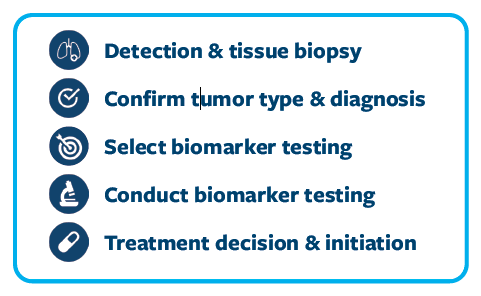Cancer biomarkers typically refer to proteins, genes, and other molecules that affect how cancer cells grow, multiply, die, and respond to other substances in the body. Your doctor may want more details about your tumor and order biomarker testing to look for mutations (changes) in the DNA of the tumor as well as levels of specific proteins. If your doctor looks for all possible mutations, regardless of whether there are drugs for these mutations, it is called comprehensive biomarker testing.
It’s all about the targets. When a particular characteristic is found through comprehensive biomarker testing, specific treatment options, called “targeted therapies,” may be considered for you. Testing will show if your tumor has certain types of gene changes. Some of these changes are known as mutations. The changes are often found in a subtype of non-small cell lung cancer called adenocarcinoma, which include these subtypes:
Please note this is only a partial list, since more mutations are being discovered through research.
- Anaplastic Lymphoma Kinase (ALK) gene rearrangement
- BRAF V600E mutation
- HER2 mutation
- Epidermal Growth Factor Receptor (EGFR) mutations
- KRAS mutation
- MET mutation
- NTRK gene rearrangement
- RET mutation
- ROS1 gene rearrangement
- PD-L1 or PD-1 protein

Here are several questions to help you guide the discussion and get the information you need to plan your treatment:
- What type of biomarker testing do I need?
- Can I still get comprehensive biomarker testing if I’ve already begun treatment?
- Is there enough biopsy tissue for testing, or will I need another biopsy?
- What is a liquid biopsy?
- How could comprehensive biomarker testing affect my course of treatment?
If your doctor doesn’t recommend biomarker testing, it is okay for you to ask, “Why not?” Testing may not be appropriate in all cases, but it is best for you to know soon after diagnosis as much as possible about your disease so that you and your doctors can be full partners in your care.
For more about biomarker testing, read our special resources here.